The true price of food
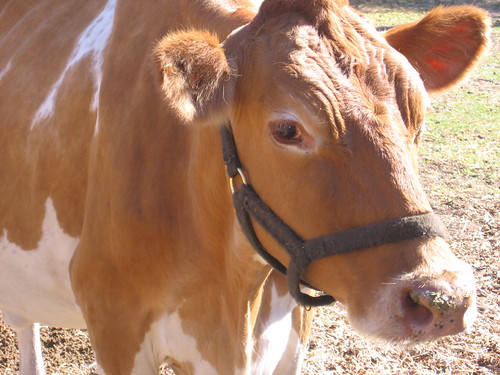
On Saturday, my family and I went the the Farmers' Market at Collingwood Children's Farm for the first time in many, many moths. In fact it was my youngest's first time there, and he's now 10 months, so this trip was special. For while it used to be one of my favourite things to do, but it got harder to do as we changed gear for the baby.
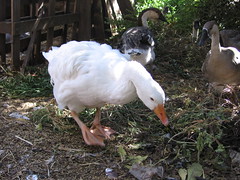 I remembered how much I enjoy the Farmers' market as I scoured the stalls for the best deals on freshly picked organic fruit and vegetables, revelling in the variety of vegetables not available at supermarkets or most standard market stalls. And visiting the farm animals.
I remembered how much I enjoy the Farmers' market as I scoured the stalls for the best deals on freshly picked organic fruit and vegetables, revelling in the variety of vegetables not available at supermarkets or most standard market stalls. And visiting the farm animals.The farm is more than a chance for the kids to happily negotiate their way through chickens, ducks and geese, watch a cow being milked (a first time for some), or pat friendly sheep. It is a way of getting to know where our food comes from.
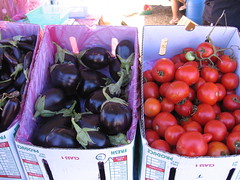 The best thing about the farmers' markets is not just the variety, or the chance of a deal on produce, but the opportunity to talk with the growers directly, and know that the money changing hands is going directly to the grower and not half-a-dozen middlemen. It is also a chance to learn something about where the food we eat comes from, and how much hard work farmers put into it.
The best thing about the farmers' markets is not just the variety, or the chance of a deal on produce, but the opportunity to talk with the growers directly, and know that the money changing hands is going directly to the grower and not half-a-dozen middlemen. It is also a chance to learn something about where the food we eat comes from, and how much hard work farmers put into it.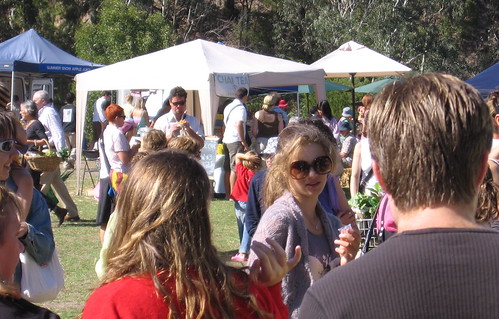
I'm certainly not alone in this, as the crowds at last Saturday's market attest. Many, many people are keenly interested in where their food comes from, how it's grown, and who's behind it. Many see this as a tonic for a toxic culture of fast food, genetically modified food, or bland, featureless supermarket produce bred for shelf-life rather than for taste.
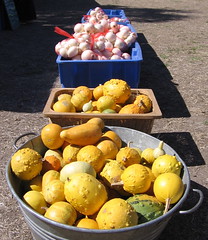 The Age food writer John Lethlean describes this as about "having a relationship with the production and preparation of what we eat". For Lethlean, this interest is best encapsulated in the Slow Food movement.
The Age food writer John Lethlean describes this as about "having a relationship with the production and preparation of what we eat". For Lethlean, this interest is best encapsulated in the Slow Food movement.Slow Food or not, my concern is predominantly with good food and food security – ensuring that our food, from the the growing and production of our food to how we turn it into a meal on our tables – is secure, free from the unfair domination by commercial interests, safe and environmentally sustainable. It is also a way of supporting farmers who want to do something different and break out of the supermarket supply-chain straightjacket.
This is especially the case for me with heritage varieties of vegetables and fruit. So it was particularly unhappy for me to learn that one of my favourite growers, whose heritage variety eggplants, apples, chillies, and other vegetables are so fabulous and fresh, will not be able to return to the farmers' markets after April, because she will lose her right to irrigation water later next that month.
 She is a Mildura based grower, and this must surely be a result of the increasing pressure that the drought, the deplorable state of the Murray River and the worsening situation for irrigators is placing on farmers in the Murray-Darling Basin. Hearing this news first hand from the grower should sharpen in the mind of any city dweller the terrible conditions of the drought and the Murray River crisis poses for our farmers and the food we eat. It did for me.
She is a Mildura based grower, and this must surely be a result of the increasing pressure that the drought, the deplorable state of the Murray River and the worsening situation for irrigators is placing on farmers in the Murray-Darling Basin. Hearing this news first hand from the grower should sharpen in the mind of any city dweller the terrible conditions of the drought and the Murray River crisis poses for our farmers and the food we eat. It did for me.You still here the odd complaint from shoppers at the farmers' market about the high price for tomatoes (organic) or other vegetables, but I'm learning to be more relaxed about such things. If I can't afford it, I don't buy it. I have learned to buy what is in season, and limit what I purchase to what my family and I can eat. But I think that more and more people are learning the true cost of food, and how the price we are paying for it at supermarkets does not reflect the cost – to the farmers, the environment and to our future food security.
The photos are by me, and you can see the rest of them on my flickr site.
Update: A good background on the Murry-Darling basin crises by Peter Cullen is on the ABC website here. Some thinking and background on food security issues is available on the WorldChanging website here. If you're interested in food security, urban farms, food production and similar issues, the 4th Annual Australian City Farms & Community Gardens Network Conference is happening in Melbourne next week.
Oh, and I found and added the link to the Age article by John Lethlean, if you want to read the rest of his piece. I enjoyed it.
Labels: animals, family, farmers' markets, farming, food, photos, urban life










2 Comments:
Now you just need to get the Pentridge Market going again...
Honestly, I've only seen the signs for the market at Pentridge (last year), but have never been.
Odd, considering it's closer to where I live that Abbotsford is.
Has the market dried up? I thought it was an initiative of the housing developers responsible for the housing estate being built on the grounds of the old prison. I wondered if something that lacked local, grassroots support would survive. The markets that seem plugged into the farmers' markets network seem to be flourishing...
But, I'm just an observer (and sometime shopper).
Post a Comment
<< Home